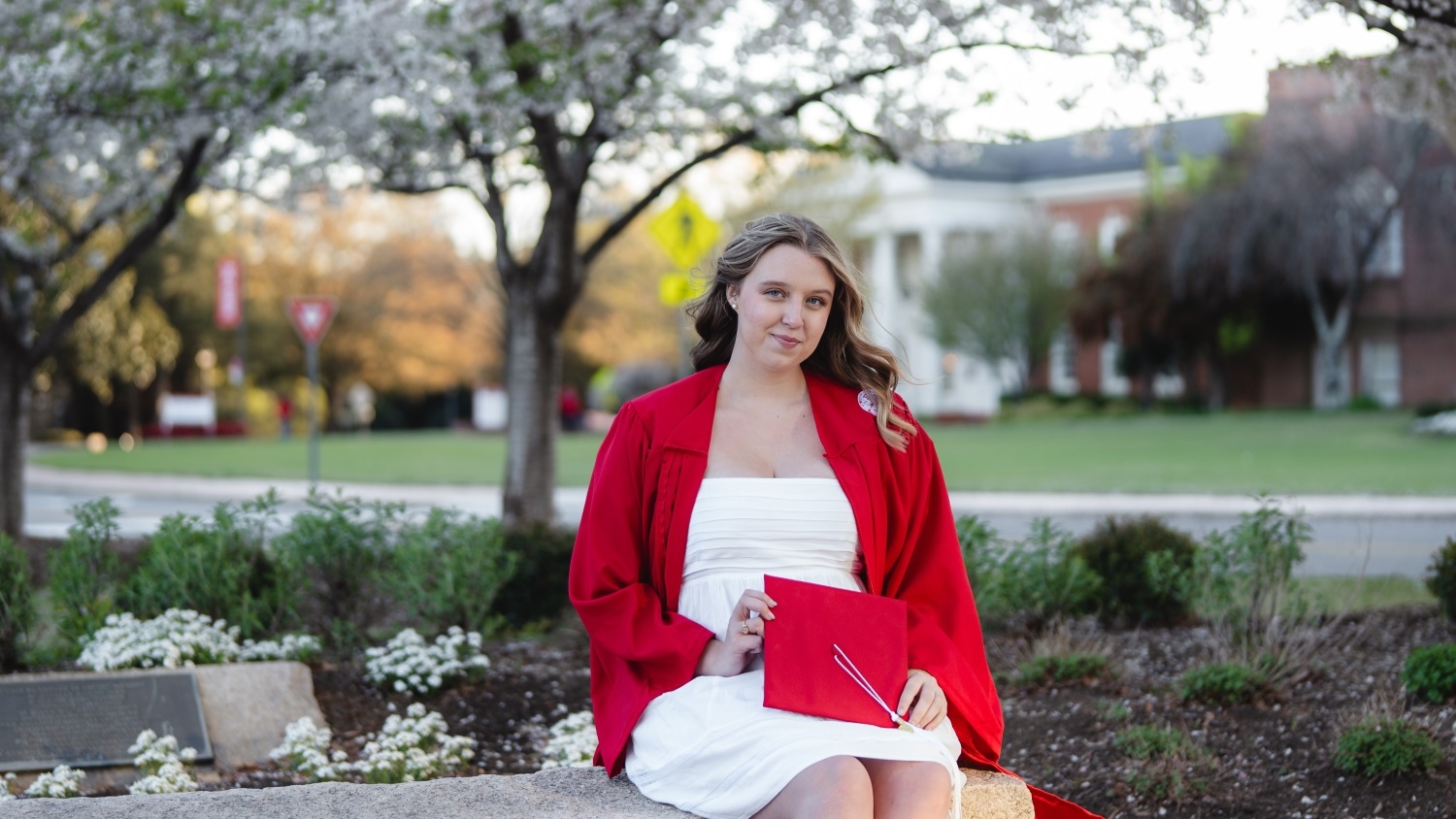There was a time in the last couple months, when, as Olivia Ball ’24 planned for what lay ahead after graduation, she thought about who she had been when she first arrived at NC State, and realized that she had grown into a completely different person — more confident, more creative, more connected to the world around her.
When had that transformation happened, she wondered. But she couldn’t pin it down to a specific moment.
Maybe it started when she joined NC State from her hometown of Clayton, N.C., with an associate’s degree and a nearly full transcript of psychology credits, which prompted her to find a second home — and second major — with sociology.
Could it have been when Ball faced her fear of undertaking her own research project, with support from the Office of Undergraduate Research and the mentorship of Virginia Riel, assistant teaching professor in the College of Humanities and Social Sciences?
It might have been when she unlocked a new understanding of her creativity and commitment to social justice while pursuing her research.
Or maybe it was when she decided that, before undertaking the rigorous process of applying to graduate programs in clinical psychology, she needed to gain additional experience in academia in the form of a teaching assistantship under Assistant Professor Yingchen He.
Was it when, after a difficult semester where the students she worked with as a TA faced new challenges on campus and off, Ball found herself opening up her first packet of course evaluations to find paragraphs and paragraphs of glowing feedback in response to the time and support she had offered?
Or was it when Ball received an email ahead of the 2023-24 academic year, notifying her that she’d been awarded the CHASS Dean’s Scholarship and Perry and Susan Safran Extraordinary Opportunity Scholarship — and that some people she’d never met were in her corner?
I want these donors to know that, as important as the finances are, it’s the knowledge someone believes in me.
Maybe it was one of those times that changed everything. Or, Ball realized, maybe it was all of them.
“It’s been a process of growth, of bettering myself and finding what I love, like sociology,” she said. “NC State has allowed me to become comfortable with change, and being here has really given me confidence in myself.”
One reason Ball has been able to find that comfort and confidence is through mentorship as she learned to develop and pursue sociology research and to teach psychology in a supportive environment.
“A philosophy I’ve really embraced is that your education is what you make of it,” she said.
Determined to make the most of her experience, Ball began each semester by introducing herself to her professors after class, asking about their research and making important connections so that she could establish a network of support. She named Riel and He — as well as Catherine Showalter in the Office of Undergraduate Research (OUR) — as key mentors to her growth and development.
At the focus of Ball’s research has been the reality for many college students, especially those from lower-income backgrounds: the way the cost of higher education and the cost of living create instability and exacerbate mental health challenges.
Under the direction of Riel, whose sociology work focuses on equal education opportunities, Ball recently completed data collection examining how students at various institutions define and experience housing insecurity; how that instability or challenge impacts mental health outcomes, academic achievements and physical effects; how apartment complexes and landlords mitigate risks in renting to students; and how students rely on groups of people similar to them when navigating their housing situations.
Funding from the Office of Undergraduate Research has helped Ball pursue this line of inquiry, and she has presented her work at the Undergraduate Research Slam and the 2023 OUR Spring Symposium, among other venues.
While Ball pursued research and TA work in preparation for the next phase of her academic career, there was an unexpected side effect: She also found that by highlighting issues with housing insecurity and being available for meetings and feedback were ways she could give back to her NC State community .
“From my own perspective I knew how important having a support system was, and I think, unfortunately, some students don’t perceive that they can get that from faculty members,” she said.
“I met so many students with diverse backgrounds and diverse needs. Of course I cared about learning how to teach psychology, but I think it was more important to me that I was able to serve as that connection and also achieve another level of mentorship.”
Ball’s schedule may sound overloaded with coursework, research and grading, all on top of the six-to-eight hour shifts she was working as a restaurant manager — a job she was grateful for, but one that was stressful to balance with school.
That’s where the CHASS Dean’s Scholarship and Safran Extraordinary Opportunity Scholarship came in.
“Suddenly, I could take the time to do what I love instead of just paying my bills,” Ball said. “It was a domino effect. The scholarships and research funding I’ve received have helped me partake in areas of academic life I wouldn’t have been able to otherwise, and that strengthened me as a person — it’s made the biggest difference.
“I’ve worked since I was 14, and I’m still working, but it’s work I really like doing.”
For Ball, this is what the phrase “extraordinary opportunity” is all about: having the chance to explore who you are, what you love and what you want to do — and create those small changes that add up to big, life-changing differences along the way.
“I want these donors to know that, as important as the finances are, it’s the knowledge someone believes in me,” she said. “This is especially important for students from marginalized backgrounds, low socioeconomic status or first-generation students. Know that you’re making an impact not in the only money you provide but by saying: I’m in your corner. I think that’s the difference between some students graduating and some students not — having that person in your corner.”
From her professors to NC State donors, Ball is grateful for those who’ve helped get to that next step. After submitting a grueling 20 applications — clinical psychology program acceptance rates hover around 2% — she will be attending the University of North Carolina at Wilmington for a Ph.D. in clinical psychology, with a non-terminal master of science degree along the way. She hopes to eventually work with underserved groups as an inpatient psychologist in an academic setting, such as a teaching hospital.
Her graduate school decision has allowed Ball to really reflect on the 70-80 hours a week she committed to her coursework, TAing, qualitative data gathering and her job with the University Honors Program over the fall semester.
“It was hard, but I felt so rewarded. Just knowing that I can multitask — and that there are times that I shouldn’t, times that I should allocate to myself,” she said. “But now I know I can do it, and I don’t think I’ve always thought that before. This is the first time I’m really proud of myself.”
This pride and confidence is something Ball will carry forward to her graduate studies. If her NC State experiences have led her to one conclusion, it’s the knowledge that she can be many things — a great student, a great researcher, a great TA.
“I think that’s especially important for young women to realize that you can do multiple things at once, and you can be great at multiple things at once. My time at NC State has really taught me that things will be hard, but it will be so worth it,” Ball said.
And with a strong support system, those tough times, as well the surprising ones and new ones, added up to a series of moments — and in life-changing NC State experiences.
To earn more about the Extraordinary Opportunity Scholarship Initiative, visit go.ncsu.edu/eosi.
This post was originally published in Giving News.
- Categories:



